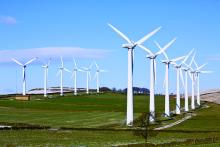The next generation of work

At the height of the pandemic, talent risk jumped 20 places in the 2020 KPMG CEO Outlook Survey [1], to become one of the leading threats to long-term growth. It was the first time in the history of the survey that the “People agenda” was seen as an urgent C-suite priority.
In subsequent months, the “great resignation” has been adding fuel to the sense of urgency around workplace issues as record numbers of highly skilled and top-performing employees have started to re-evaluate their jobs and careers. First-hand experiences over the past two years have further increased their social awareness. Employees are reassessing what’s important to them and, for some, this has led to different choices about the future of their careers and work.
The result is an acute labour shortage in many industries around the world, making it a strategic necessity to attract and keep the very best employees.

Employee choice — the pursuit of purpose and value
Important attitudinal changes are driving many of these new employment choices, especially among high-potential younger generations. In the same way that customer preferences drive purchasing decisions, employees are now expressing a preference for the types of companies where they want to work. Their preference is often influenced by what they view to be socially responsible companies that have a meaningful purpose. A clear sense of purpose and the opportunity to be involved in meaningful work is attracting and retaining top employees who can contribute to both high business and social performance.
As KPMG’s recent research in the report The future of HR: Lessons from the pathfinders suggests, organisations are now working hard to create work cultures in which there’s a shared purpose that attracts and retains the very best talent. By and large, family businesses are already there. A purpose-driven culture underpinned by strong family and social values has long been a key to their success. Their historic commitment to community, environmental and social issues ticks most of the employee preference boxes, but it doesn’t stop there.
In the recent KPMG Private Enterprise and STEP Project Global Consortium report The regenerative power of family businesses: Transgenerational entrepreneurship, we took a deep dive into the secrets behind the long-term, sustained performance of family businesses. We found that the majority are actively developing the capabilities of their next-generation leaders, many of whom are young, digitally savvy and introducing a fresh perspective on product, service and operating innovations. They’re new-age entrepreneurs and they’re helping to create an exciting new vision for the future of the business.

Tapping into the value of the next generation
It’s no wonder that family businesses are already the preferred choice of so many high-performing employees. The strength of the families’ values, social purpose, persistent entrepreneurial drive and environmental stewardship are characteristics that have long proven to be competitive differentiators. And empowering next-generation family members and employees to help shape the future adds even more strength to that advantage.
I’ve had the opportunity to experience the results first hand where vibrant organisation-wide entrepreneurial cultures have become competitive game changers. And I believe family businesses can — and should — be role models for the future of work in all types of businesses.

Key takeaways from the family business model
The success of every family business is founded on its own unique characteristics, but there are many lessons and practices for every business to take away in building the workplace of the future.
In my experience, these are some of the factors that continue to position family businesses as the preferred choice of top-performing employees:
· The strength of the company’s innovation and entrepreneurial orientation — continuously looking for opportunities to create innovative products and services and pursue new markets.
· The impact of next-generation family members and employees on the direction of the business by giving them opportunities to contribute new ways of thinking about the business and introducing product and service innovations.
· Tapping into digitally savvy capabilities of next-generation family members and employees to drive technological breakthroughs.
· Recognising the value of increased diversity in creating a distinctive, long-term outlook for the business.
· Actively evaluating the leadership potential of family members and employees across the spectrum of age, gender, ethnicity and experiences outside the business.
I would be very interested in hearing from you about the impact that workforce changes are having on your business and the actions you’re taking to maintaining a position as the preferred choice of high-performing employees.
Find out more about the formula behind the long-term, sustained performance of family businesses in the KPMG Private Enterprise and STEP Project Global Consortium global family business report The regenerative power of family businesses: Transgenerational entrepreneurship.
[1] 2020 CEO Outlook: COVID-19 Special Edition, KPMG International.






